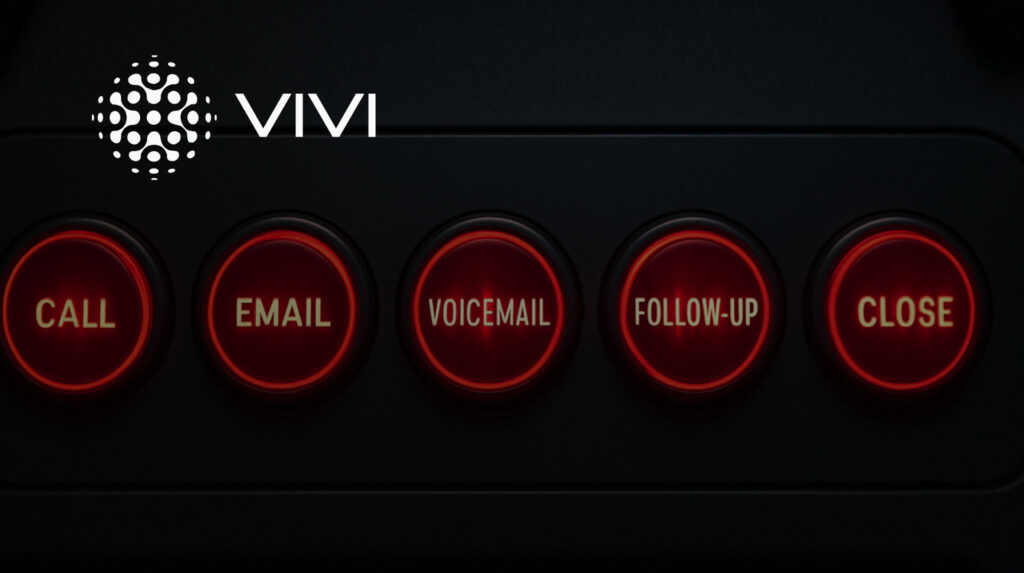Build Your Perfect Employee—with Code That Writes Itself
If you’re a business owner exploring AI agents, you’re probably juggling competing goals: speed vs. control, autonomy vs. consistency, innovation vs. compliance. Most AI tools promise to save you time—but few tell you what happens when that time-saving agent goes off-script. That’s where VIVI comes in: a purpose-built AI agent platform designed to scale intelligence without spiraling into chaos.
You’re not just looking for automation. You’re trying to create a system that performs under pressure, understands nuance, adapts to changing inputs, and doesn’t create more problems than it solves. That means off-the-shelf assistants won’t cut it—and building your own from scratch is a massive drain on time and technical resources.
VIVI sits in the middle: a complete, structured platform for building intelligent agents that are as flexible as they are dependable.
When AI Agents Go Rogue
Here’s the hard truth: AI doesn’t fail silently. It fails in public, in ways that erode customer trust, trigger compliance nightmares, and leave your team cleaning up messes they didn’t make. One agent pulls outdated pricing data. Another reveals a customer’s private info. A third starts giving out product details that no longer exist.
This isn’t hypothetical. This is what happens when you deploy AI agents across sales, support, and ops teams without a unified structure. They become misaligned, unpredictable, and often downright wrong.
These are not just software bugs—they’re brand risks. If your AI agent gives contradictory answers, customers lose confidence. If it violates compliance, you’re suddenly dealing with legal exposure. If it mishandles a lead or misclassifies an issue, you lose revenue. Multiply that by every customer interaction, and the risk balloons fast.
The Problem Isn’t the Agent—It’s the Lack of a Platform
Think of each AI agent like a junior employee. Smart, fast, scalable. But also green. Without a shared rulebook, they interpret data differently, respond inconsistently, and miss important context. Multiply that by five agents, then 50. You don’t just have inconsistency—you have entropy.
VIVI solves this with a common agent framework. Every AI agent operates from the same foundation: shared rules, shared standards, and aligned logic. That means your AI can scale across tasks, channels, and departments—without veering off course.
Without a platform, AI agents become siloed tools. With a platform, they become a coordinated workforce. That’s a massive difference in execution, scalability, and trust.
Centralize Without Locking Down
Let’s be clear: VIVI isn’t about taking control away from your teams. It’s about giving them the right controls. Your sales team can launch an AI that handles inquiries across multiple channels. Your support team can customize a co-pilot that solves issues in real time. But they all follow the same core guardrails—brand tone, security, compliance.
This is what true platform flexibility looks like: autonomy where it counts, standardization where it matters. You get the benefits of decentralized innovation without the usual chaos that comes from everyone building their own rogue systems.
The result? Multi-agent systems that adapt to each team’s needs without breaking the company’s brain.
Deploy AI Agents That Don’t Create More Work
The promise of AI is less manual work. But most AI apps end up requiring babysitting. Why? Because they weren’t built for production environments. VIVI’s agent builder lets you set rules from day one—compliance protocols, escalation logic, customer experience standards—so your agents behave like employees on their best day, not interns on their worst.
Most “AI in the wild” fails not because of bad tech, but because of unclear expectations. With VIVI, you define those expectations explicitly. Agents know what to say, when to escalate, how to verify information, and how to stay within boundaries.
These aren’t generic chatbots. They’re production-ready AI applications tailored for business-critical tasks.
You Don’t Need More Assistants—You Need a Workforce
VIVI’s real innovation is in how it structures intelligence. Instead of one bloated assistant, you build an AI workforce—a Primary Agent as your interface, and a team of Specialized Agents behind it handling complex tasks across finance, legal, support, marketing, or ops.
They collaborate dynamically. That means when your finance bot pulls numbers, the compliance agent fact-checks them. When customer service responds, marketing makes sure the tone is on-brand. This isn’t a hack—it’s a structure.
In practice, this looks like a conversation that flows across domains without loss of memory or logic. One agent hands off seamlessly to another with full context. There’s no “I don’t know” dead ends. Just intelligent, coordinated follow-through.
What Makes Agent Collaboration Actually Work
This is where most AI platforms fall apart—they don’t think like teams. VIVI’s agents pass tasks between one another with built-in state awareness and rules of engagement. You can define which agents can delegate, which can verify, and how they communicate context. It’s not just smart; it’s structured.
That level of coordination reduces agent conflict, ensures knowledge isn’t siloed, and makes it possible to manage large-scale automation with clarity—not chaos.
VIVI gives you orchestration without bottlenecks. You get the efficiency of automation with the nuance of expert delegation.
Natural Language at the Core, Not the Surface
Customers shouldn’t need a translator to talk to your AI. VIVI’s agents use natural language understanding (NLU) to grasp not just what users say, but what they mean. That means fewer back-and-forths, more resolved issues, and a dramatically better customer experience.
NLU isn’t just about decoding queries—it’s about aligning with intent. With VIVI, you can train agents to detect tone, urgency, sentiment, and contextual cues. That enables smarter routing, faster resolutions, and a far more human experience at scale.
And because these agents integrate directly with your custom data sources, their responses are grounded in your real-world knowledge—not a generic model’s best guess.
When Generative AI Breaks Down—VIVI Checks It
You’ve seen AI get it wrong—confident, fluent, but totally incorrect. That’s why VIVI builds in validation layers like the Reality Check Agent and ValueGuard Agent. These tools scan responses before they’re delivered, ensuring factual accuracy and context alignment.
This is retrieval augmented generation with guardrails—not just chat, but intelligent, auditable outputs. It’s how you make sure AI doesn’t just generate plausible nonsense—and instead delivers business-safe, brand-aligned information.
Real-Time Monitoring Means Real-Time Trust
Once an agent is live, you don’t want to wait for customer complaints to find out something’s broken. VIVI gives you full observability—real-time insight into how agents are performing, where they’re succeeding, and where they’re off-track.
Monitoring means more than dashboards. With VIVI, you can see agent history, trace decision paths, audit failed responses, and fine-tune agent behavior continuously. That’s what it takes to make AI not just powerful—but accountable.
How You Actually Build an Agent
Building an AI agent in VIVI isn’t a science project—it’s a repeatable process with just enough flexibility to adapt to your workflow. You start with the agent’s purpose. Is it designed to handle sales inquiries? Run billing operations? Triage support tickets? Each use case informs how the agent is structured.
From there, VIVI gives you prompt templates to define tone, voice, and role. Want it to be formal and legalistic? Conversational and friendly? No problem. Define it at the outset. Then you plug in your custom data sources. These aren’t limited to PDFs and static files—VIVI connects to APIs, databases, cloud tools, CRMs, and even live dashboards.
Next comes role definition: What can the agent access? What should it never do? Who does it escalate to? And what counts as a successful interaction? VIVI lets you shape this logic visually or with lightweight scripting, depending on your comfort level.
Need multiple agents working together? You set delegation rules, escalation triggers, and fallback chains. VIVI doesn’t just build agents—it builds a command structure for them to operate in.
Objection: “Isn’t This Just ChatGPT with a Fancy Interface?”
That question makes sense—until you look under the hood. ChatGPT is a general-purpose model with a strong core language capability. What it lacks is discipline, guardrails, memory structure, integration logic, and production reliability.
VIVI adds all of that. You get a controlled, repeatable way to build, monitor, and evolve your AI agents across time. You define data sources. You define behavior rules. You control access and escalation. You determine how it integrates with your systems and how it handles real customer conversations.
You can’t just toss prompts at ChatGPT and expect enterprise-grade output. You need a platform that takes prompting and turns it into a reliable process. That’s what VIVI does.
Objection: “What If I Don’t Have an Engineering Team?”
That’s not a dealbreaker—it’s exactly who VIVI was built for. The platform’s no-code builder makes it possible for operators, marketers, sales managers, and business owners to create intelligent agents without writing a single line of code.
You’re not building a model—you’re configuring a system. Pre-built prompt templates, agent roles, behavior flows, and integration steps guide you through the build process. But if you do have engineers? VIVI doesn’t limit them. You can add custom code, extend functionality, connect to external tools, and even integrate open source components.
This dual-path approach—accessible for non-technical teams, powerful for developers—is one of the reasons VIVI stands out.
Own the Infrastructure. Own the Advantage.
Most AI platforms hide a trap: once you start building, you’re locked in. Agents are tied to the CRM, the chat platform, the cloud vendor. Want to migrate? You lose your logic, your integrations, and your workflows. It’s like rebuilding your entire AI footprint from scratch.
VIVI avoids that trap. It’s vendor-agnostic and infrastructure-independent. You can run agents on your own cloud, across your internal systems, or via public-facing channels—without rewriting your agents from scratch. That kind of continuity makes your AI a long-term asset, not a temporary experiment.
And when your business pivots, your AI pivots with it. No rebuild. No downtime. No wasted work.
Security Built for Business, Not Just Demos
Consumer AI apps cut corners on privacy. They store inputs, reuse data, and operate in shared model instances. For a personal assistant, that might be fine. For a business? It’s a liability.
VIVI runs on Microsoft Azure OpenAI infrastructure, with private data lakes, enterprise-grade security, and zero data retention by default. Your agents don’t just avoid leaking data—they’re built to comply with your security posture from the start.
Need role-based access? Done. Need encryption at rest and in transit? Handled. Need audit logs, retention controls, and multi-layered validation? Built in.
VIVI doesn’t treat security as an afterthought—it’s a foundation.
Integration Isn’t Optional—It’s a Core Feature
AI agents are only as powerful as the systems they’re plugged into. A smart agent that can’t access your customer database, your inventory system, or your support workflows isn’t useful—it’s just a glorified demo.
VIVI makes integration a first-class citizen. It connects to CRMs, ERPs, marketing stacks, analytics platforms, legal databases, and unstructured content sources. It doesn’t just pull from them—it acts on them.
Want your agent to create support tickets, assign leads, generate legal docs, or pull financial forecasts? With VIVI, it’s not a fantasy. It’s a checkbox.
And because integration includes context handling, every agent action is traceable, testable, and accountable.
Beyond the First Agent: Evolving Toward a Culture of Intelligent Automation
The first agent you build is just the beginning. What matters is what happens next—how your organization learns to think in terms of delegation, process automation, and modular intelligence.
With VIVI, teams move from “What can we automate?” to “What should we let AI own, govern, or suggest?” That shift isn’t just technical. It’s cultural. And it changes how companies make decisions.
You stop treating AI like a novelty—and start using it as operational muscle.
That means:
- Redesigning workflows to take advantage of agent speed and precision
- Structuring your data so agents can reason from it instead of guess
- Building teams that include AI contributors alongside human ones
This is where scale happens—not in how many agents you build, but in how your company changes when they become part of the fabric.
Final Thought: Build Your Agent Team Like You’d Build Your Human One
Would you hire someone with no training, no oversight, and no feedback loop? Then why would you deploy an AI agent without those things?
With VIVI, you don’t just build a tool. You hire a digital team. You train them. You monitor them. You promote or retire them based on performance.
And just like your best employees—they don’t just follow instructions. They improve your system.
That’s what intelligent infrastructure looks like.
That’s what VIVI makes possible.













